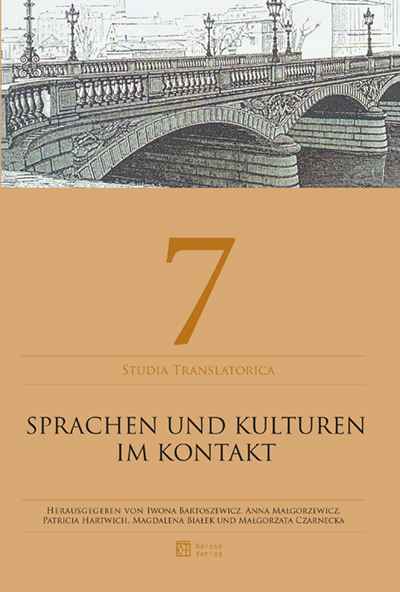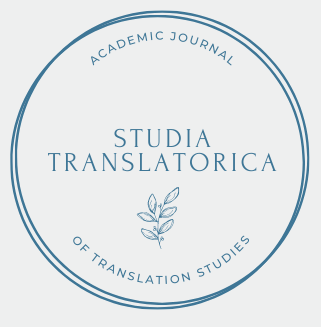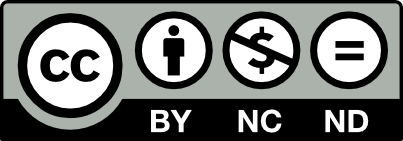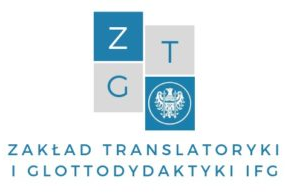
Studia Translatorica
Numer 7 (2016): Sprachen und Kulturen im Kontakt
Redakcja: Iwona Bartoszewicz, Anna Małgorzewicz, Patricia Hartwich, Magdalena Białek i Małgorzata Czarnecka
Zur Strategie der Hinwendung in bilingualen deutsch-polnischen Diskursen. Vorüberlegungen zum integrativen Herangehen an die Schnittstelle von Translationswissenschaft und Diskursanalyse / The strategy of orientation in bilingual German-Polish discourse: Preliminary considerations on integrated approach to Translation Studies and Discourse Analysis
DOI: --- (data publikacji online: 2020-06-14)
Słowa kluczowe: strategy of positioning, bilingual German-Polish discourses
This article discusses less-studied aspects of bilingual public discourse, using the example of the bilingual German-Polish press and a selected joint statement by Polish and German archbishops from 2009. The discussion highlights the role of the category of perspective and asymmetry in shaping public bilingual discourses. The article proposes that the “orientation” model be used to examine the strategy of shaping public bilingual discourse.
Spuren von Sprachen und Kulturen in Modellen der Nachhaltigkeitskommunikation / Traces of languages and cultures in models of communicating sustainability
DOI: --- (data publikacji online: 2020-06-14)
Słowa kluczowe: sustainability communication, meaning construction, interdisciplinary approach, climate change, sustainable cities, product design
The area of sustainability or communication of sustainability provides an area for observing the dynamics of conceptualizations and meaning construction. Whereas the central ideas have been developed during several epochs and disciplines, some basic concepts seem to survive until our days. The present contribution aims at demonstrating some strategies of how language use operates as indicator for different kinds of modeling different perspectives on reality. Starting from the semantic preconditions of conceptual constructions (text analysis, language-knowledge-relationship) four situations of communication are reflected: the historical development of concepts of sustainability and several specifications in the areas of climate change, city development and product design. Common to all is the fact that they are oriented towards the basic idea of change and transformation. In this perspective some strategies of how to approach this complex area of questions concerning interdisciplinary (international) communication are demonstrated.
Zu einigen Problemen der Darstellung von Kollokationen im deutsch-polnischen Kollokationswörterbuch / About some problems with the description of collocations in the German and Polish collocation dictionary
DOI: --- (data publikacji online: 2020-06-14)
Słowa kluczowe: monolingual and bilingual collocation dictionaries, macrostructure, microstructure, keyword articles, substantive bases, homonymy, hypernymy, equivalence, cultureme
This article is the result of research on bilingual collocation lexicography aiming at publishing a German-Polish Collocation-Dictionary in a joint project of Humboldt University in Berlin and University of Wrocław. Despite the publication of many bilingual collocation dictionaries in the past 5 years (i.a. Quasthoff 2011, Häcki Buhofer/Dräger/Meier/Roth 2014, Hollós 2014, Konecny/Autelli 2015), a gap remains as far as German-Polish lexicography is concerned. The planned compendium of morphosyntactic and lexico-semantic divergent collocations is supposed to close this gap. It also should raise, foster and build the awareness of collocations among learners of German and Polish.
Kollokationen im deutsch-polnischen Vergleich und deren lexikografische Beschreibung / German and Polish collocations in a contrastive approach and their lexicographical description
DOI: --- (data publikacji online: 2020-06-14)
Słowa kluczowe: collocation, collocations in Polish and German, collocation patterns, lexicographical description, lexicography of collocations, linguistic corpora
The purpose of this article is to present the draft of the lexicographical description of German and Polish collocations in a contrastive approach and to show how the linguistic corpora of German (DeReKo) and Polish (NKJP) can be used to identify significant lexical collocations. This corpus-based analysis has been carried out from a lexicographical and contrastive German-Polish and Polish-German perspective.
Verflechtung und Entflechtung von deutscher und arabischer bzw. irakischer Identität in der Grenzgängerliteratur des Chamisso-Förderpreisträgers von 2010 Abbas Khider / Bundling and unbundling of German and Arabic/Iraqi identity in the border-crossing literature of 2010 Adelbert von Chamisso Prize winner Abbas Khider
DOI: --- (data publikacji online: 2020-06-14)
Słowa kluczowe: Abbas Khider, Arabic/Iraqi Identity, intercultural studies, Adelbert von Chamisso Prize
This paper discusses the bundling and unbundling of linguistic, national and religious transcultural components of identity in the literature of the German/Iraqi author Abbas Khider, who was awarded in 2010 with the Adelbert von Chamisso Prize in Literature. Khider and Chamisso shared the experience of a vital life between two cultures. They both have found a new home in the German language. This paper focuses on Khider’s literature. His novels reflect double identity through language. Moreover, this paper sheds some light on The Adelbert von Chamisso Prize itself, which is presented in Munich every year by the Robert Bosch Association and the Bavarian Academy of Fine Arts. This prize is given to authors who write in German although it is not their mother tongue. It is a symbol of the new multicultural Germany, which is becoming more interested in the emigration literature.
Tempus- und Modusformen in Gerichtsentscheidungen / Tense and mode forms in court decisions
DOI: --- (data publikacji online: 2020-06-14)
Słowa kluczowe: legal language, court decision, verb forms, translation
This text is a text linguistic analysis of German and Czech court decisions. A particular attention is paid to the use of tense and mode forms. The analysis shows that German court decisions use certain tense and mode forms in connection with specific information while Czech decisions make use of typical formulations and expressions. A combination of certain verb forms with specific information can be observed only partially here. Of course, the differences are based on the grammatical systems of these two languages, but the analysis shows which points in translations, especially concerning German as the target language, one should focus on.
Ustalanie ekwiwalentów terminów prawnych w różnych systemach prawnych na przykładzie pola terminologicznego kurator i jego odpowiedników w języku niemieckim / Determination of equivalents of legal terms in various legal systems as exemplified by the terminological field of the term guardian and the equivalents thereof in German
DOI: --- (data publikacji online: 2020-06-14)
Słowa kluczowe: terminological field, distribution of legal terms, notional equivalence, functional equivalent, legal terminology
The paper aims to present how to avoid terminological errors by means of a terminological field while considering the distribution of the given term on the example of the legal term guardian. German equivalents suggested by selected specialised dictionaries were subjected to a confrontation analysis with attention to errors made when elaborating the entries.
Die Adäquatheit und die Skopostheorie als konstituierende Ansätze der zielorientierten Übersetzung / Adequacy and skopos theory as constituent approaches in purpose-oriented translation
DOI: --- (data publikacji online: 2020-06-14)
Słowa kluczowe: adequacy, skopos theory, translation, functional
The main subject of the article is to show the importance of adequacy and skopos theory for the purpose-oriented translation. The article describes the foundation of the skopos theory and purpose-oriented types of translation that are related to this theory. This paper focuses on presenting the most important characteristics and principles of skopos theory, which has been formulated by Reiß/Vermeer in 1984.
Kazimirza Filipa Wize przekład poematu Heinricha Heinego „Deutschland. Ein Wintermärchen” („Niemcy. Baśń zimowa”). Próba krytyki przekładu / On Polish translations of Heinrich Heine’s poetry on the example of the epic poem “Germany. A Winter’s Tale” by Kazimirz Filip Wize
DOI: --- (data publikacji online: 2020-06-14)
Słowa kluczowe: Kazimirz Filip Wize, literary translation, German poetry, political literature
Selected translations of Heinrich Heine’s poetry are discussed in this article along with his connections with Poland. The majority of the nineteenth century translations of Heine’s poems and his other poetry works were completed by amateur translators, and as such they do not aspire to be treated as artistic literature. The same applies to a number of translations made in the 20th century. Heine’s poetry abounds in allusions, references to aesthetic and political disputes therefore its translation requires relevant language and cultural competence. The examples referred to in this article seem – in today’s terms – to be just historical examples of Polish literature; their language is archaic and unavailable to a modern reader.
Mehrsprachigkeit in der literarischen Übersetzung / Multilingualism in literary translation
DOI: --- (data publikacji online: 2020-06-14)
Słowa kluczowe: multilingualism in literary translation, translator’s creativity, translation techniques
The paper deals with selected aspects of literary translation which focus on the issue of multilingualism. Some problems arising from translating Vladimir Kaminer’s “Die Reise nach Trulala” are exemplified here. The analytical part consists of a review and a description of the translation techniques applied by Barbara Kocowska in her Polish translation of the foreign words and phrases, and proper names in the novel.
Translatorische Herausforderungen der phraseologischen Wendungen am Beispiel des literarischen Textes „Die Blechtrommel“. Zur Übersetzung unveränderter Phraseologismen mit den phraseologischen Einheiten der Zielsprache / Translation challenges posed by phraseological units on the example of a literary text: The translation of the unchanged phraseological units by means of target-language idioms
DOI: --- (data publikacji online: 2020-06-14)
Słowa kluczowe: unchanged phraseological units, phraseology, translation, literary text
The subject of this article is a search for idioms in novel “The Tin Drum” (German: “Die Blechtrommel”) written by Günter Grass and its comparison with Polish translation. What follows is the categorisation of examples into separate groups according to their correspondence. The theoretical part aims to demonstrate that phraseology is a linguistic science coping with characterization of phraselogical units. The practical part deals with idioms found in above mentioned novel and their analysis on the basis of the correspondence between German original and Polish translation. Following the German-Polish translation comparison, possibilities, difficulties and limits of the translation of the unchanged phraseological units are shown and systematically illustrated.
Zur (Un-)Übersetzbarkeit von Emotionen am Beispiel von Jan Kochanowskis Zyklus „Treny“ und dessen Nachdichtungen ins Deutsche / The (un-)translatability of emotions on the example of Jan Kochanowski’s poetical cycle “Treny” and its renderings into German
DOI: --- (data publikacji online: 2020-06-14)
Słowa kluczowe: poetical cycle, (un-)translatability, emotion, rendering
The rendering of poetry is seen by many translation theorists as an impossible task because of the complexity of poetry. The translator has to not only convey the content of the poem in the target language but also maintain the poetic form. The aim of this article is to illustrate how different translators dealt with this difficult, but not impossible undertaking in their renderings of Jan Kochanowskis poetical cycle into German, with regard to the lexemes which express emotions. The confrontational analysis shows that poetry and emotions enclosed in it, despite many difficulties, are translatable.
Probleme der Übersetzer am Beispiel der Neologismen aus „Dzienniki gwiazdowe“ von Stanisław Lem und ihrer Übersetzung ins Deutsche / Translator’s problems on the example of neologisms from Stanisław Lem’s “Dzienniki gwiazdowe” and their translations into German
DOI: --- (data publikacji online: 2020-06-14)
Słowa kluczowe: Lem, neologism, reception, translation techniques, translation, creativity
Stanisław Lem’s works constitute a considerable challenge not only for the readers, but also for a translator who has to take the author’s unique style into consideration while translating the text. This so-called Lem’s style consists above all of neologisms, which can be rendered into another language only thanks to translator’s creativity and feel for language. The analysis of specific examples taken from “Dzienniki gwiazdowe” and of techniques used in translation leads to the conclusion that the translator did indeed translate the text, but he did not render the style and character of the original work.
Sex, Geschlecht, Geschlechterverhältnisse – Tabubrüche in der Prosa von Dorota Masłowska und deren deutscher Übersetzung / Sex, gender, gender ratio: Taboo violation in Dorota Masłowska’s novel and its German translation
DOI: --- (data publikacji online: 2020-06-14)
Słowa kluczowe: Polish-German translation, sex as taboo, Dorota Masłowska, taboo(breaking) in the Polish literature
Dorota Masłowska is an author well-known for tackling topics which are regarded as taboo in Poland. Due to many examples of sex and gender related taboo violations her novel “Wojna polsko-ruska pod flagą biało-czerwoną” has been described as outrageous. The descriptions and remarks in this book do not have much in common with the socially accepted, romantic ideas concerning sexual intercourse. This paper draws on the understanding of a German term “Geschlecht” by Ute Frietsch. She understands it not only as sexual acts, but also as sex features, genitalia as well as culturally and socially formed gender ratio (Frietsch 2008: 10). The examples discussed in this paper concern three aspects. First, how the taboo is broken by Dorota Masłowska with literary means. Second, what decisions have been made by the German translator in order to translate the violation of taboo. Third, the issue will be discussed whether the German reader is confronted with as intense taboo violation as the Polish one.
Nauczanie języków i kultur w polskiej szkole a europejska polityka językowa / Teaching languages and cultures in Polish schools. Responding to the European language policy
DOI: --- (data publikacji online: 2020-06-14)
Słowa kluczowe: language education policy, European institutions, languages, cultures, education, school language teaching, school projects
The chapter outlines trends in language education policies of the Council of Europe, the European Union and the Organisation for Economic Cooperation and Development. Special attention is given to the promotion of individual and societal multilingualism, protection of less widely used languages, care for national / ethnic languages, broadening the spectrum of languages taught in school systems as well as contributing to the education for tolerance. Against this background examples of outstanding Polish school projects completed within the frames of eTwinning and the European Language Label are presented and issues involved in designing whole school language education programs are discussed.
Die graphemisch-perzeptive Interferenz aus dem Deutschen (als L1 oder L2) als Problem beim Ausspracheerwerb im Niederländischen / The graphical-perceptive interference from German (L1 and L2) as a problem in the process of the acquisition of Dutch pronunciation
DOI: --- (data publikacji online: 2020-06-14)
Słowa kluczowe: German, Dutch, phonetic interference, graphic interference, foreign accent
The text analyses the problem of combined phonetic-graphical interference from German as L1 and L2 in the currently learned foreign language (Dutch). Both theoretical and practical questions are answered. A speech-analysis which shows examples of combined phonetic-graphical interference is also provided. The results of the analysis demonstrate that combined phoneticgraphical influence from German as L1 or L2 is a common problem in the acquisition of Dutch pronunciation and must be taken into consideration while planning pronunciation lessons.
Sprachdidaktik in mehrsprachigen Lernergruppen am Beispiel von DaZ mit besonderem Augenmerk auf Integrationskurse / Language teaching in multilingual learning groups on the example of integration courses
DOI: --- (data publikacji online: 2020-06-14)
Słowa kluczowe: the role of books for German as a foreign language in promoting multilingualism, integration course, didactics, reflection on the learning process
With the arrival of 1 million refugees in Germany, the universities and German courses are becoming more and more heterogeneous. Due to this fact, it is necessary to analyse how we can didactically include other languages in the German language course as both a foreign language and a second language. Therefore, we must take a look into modern and popular German course books for adults to see if they include other languages and if so, how it is done. It is also interesting to see whether teachers of German language keep insisting on a monolingual teaching form.
Mehrsprachigkeit – Zwischen Annahmen und Realität. Versuch einer Bilanz am Beispiel der Sprachlernbiografien polnischer Studenten / Multilingualism – between assumptions and reality: An overview on the example of language learning biographies of Polish students
DOI: --- (data publikacji online: 2020-06-14)
Słowa kluczowe: multilingualism, language biography, learning foreign languages
One of the aims of the common European language policy is achieving multilingualism. The realization of the concept of multilingualism can, however, be implemented in different ways. In our presentation, we are trying to analyse the concept of multilingualism and in particular its implementation. The starting point for our study is the survey that was conducted in May 2015 among students of German linguistics in Poland. The survey results are analysed with regard to the realization of multilingualism concept on the example of specific language learning biographies of students.
Die Muttersprache im Gefüge der Mehrsprachigkeit / Mother tongue in the framework of multilingualism
DOI: --- (data publikacji online: 2020-06-14)
Słowa kluczowe: multilingualism, mother tongue, multiculturalism, language politics, language community
The term ‘multilingualism’ means that one learns and is being taught different languages in an integrative way (not separately from one another). Therefore, the continuous, life-long learning (and cultivation) of one’s mother tongue should be perceived as crucial. Our mother tongues reflect traditions, history and value systems. They are also the very first tool of communication that we acquire. They enable us to explore and name the world and its phenomena. In language communities and communities of given countries, they are also recognized and used as official languages, languages of science and of instruction. Other languages are acquired on the basis of them. Therefore, any language politics should always pay particular attention to continuous cultivation of mother tongues. As a result, the perception of multilingualism should resemble that of multiculturalism. Languages should be taught and acquired in communicative linguistic and cultural communities in an integrative, equal and simultaneous way, with the use of adstrate elements and taking into consideration trans-relations between languages.
Tunesische Germanistikstudierende zwischen revolutionären und akademischen Bildungsvorstellungen / German language students in Tunisia caught between revolutionary and academic education ideas: An empirical study
DOI: --- (data publikacji online: 2020-06-14)
Słowa kluczowe: higher education, transformation process, revolution, culture of learning
Since December 2010, when protests first started in Tunisia, there have been many changes and reforms in the broader Arab world. Following the revolution, the future of higher education in Tunisia has been under debate in the media. Because Tunisia is in the process of social transformation, we should consider its higher education. The Tunisian education system was adopted from the traditional French model, where technical and vocational skills are prioritized over creative and analytical thinking. Since the Tunisian revolution, are the educational values still a priority or is the university academic system in the process of changing? Can we create a new culture of learning as a result of political changes? Have problems in higher education been identified and what should reform priorities be?
Eine komparative Beschäftigung mit deutschen Elementen in Sprachen des östlichen Europa als gemeinsames Potenzial für hiesige Deutschdidaktiken / A comparative analysis of German borrowings in the languages of Central and Eastern Europe
DOI: --- (data publikacji online: 2020-06-14)
Słowa kluczowe: German borrowings, comparative linguistics, teaching German as a foreign language, Central and Eastern Europe, language learning motivation
Various kinds of borrowings from German have been incorporated into the vernaculars and standard languages of Central and Eastern Europe. However, teaching German as a foreign language has barely used this potential bridge for the learners. This article shows the possibilities of increasing the motivation of the learners of German by using this bridge, which could also be of help to L1-speakers of Central and Eastern European languages in their communication with one another.
Motivierung zum Deutschlernen als L3 nach Englisch: Theoretische Grundlagen und Umriss der Forschungsmethodologie / Motivating to learn German as L3 after English: Theoretical basis and outline of research methodology
DOI: --- (data publikacji online: 2020-06-14)
Słowa kluczowe: motivation to learn foreign languages, motivating to learn foreign languages, multilingualism
This contribution briefly explains the situation of foreign language learning in the Czech Republic which inspired the creation of a project for a dissertation. The project is devoted to the motivational strategies a teacher can use in teaching German as L3 in order to motivate his students to learn German after English. This contribution describes the theoretical foundation of the project and the methodology of the intended research.
Status Quo des Deutschen als Fremdsprache und der sprachlich-interkulturellen Bildung im Kindergarten und in der Primarstufe in Polen / The status quo of German as a foreign language and intercultural teaching in Polish preschool and early elementary education
DOI: --- (data publikacji online: 2020-06-14)
Słowa kluczowe: intercultural education, foreign language teaching, preschool, early elementary education
This article presents the results of a study of foreign language teaching and intercultural education in Polish preschools as well as the first years of elementary school. The study is only a small part of a larger-scale empirical research focusing on the condition of the German language in the Visegrad Group countries. In the article, the extensive theoretical part has been replaced with a presentation of the results of a survey carried out among a group of 150 parents of preschool children, 150 pupils of early elementary school, and 7 teachers at these educational levels.
Plurizentrische Perspektive im Phonetikunterricht des Deutschen / Pluricentric perspective in German phonetics teaching
DOI: --- (data publikacji online: 2020-06-14)
Słowa kluczowe: pluricentric languages, phonetics of German
The paper deals with the consideration of pluricentric perspective in phonetics teaching in German studies. A systematic knowledge of the standard varieties of German, and partly the regional and dialectal features of pronunciation and prosody, contributes to intercultural awareness and understanding of the varieties of German.
Unterrichtstechniken im DaF-Unterricht an heutigen polnischen Schulen am Beispiel der ausgewählten Ausbildungsstätten in der zweiten Schulbildungsphase (4.-6. Klasse der Grundschule) / Teaching techniques in foreign language acquisition in contemporary Polish schools based on the example of selected primary schools (grades 4–6)
DOI: --- (data publikacji online: 2020-06-14)
Słowa kluczowe: teaching techniques, German language acquisition, learning activities, social forms
This paper aims to answer the following question: Has the contemporary German language acquisition in Polish schools really abandoned the traditional approach to modern foreign languages? The author has analysed the teaching and learning activities, the social forms and the media applied in three grades in Polish schools and makes an attempt to put the experiences gathered by those who learn foreign languages in Polish schools into a broader context.
Holger Siever (2015): Übersetzungswissenschaft. Eine Einführung. Tübingen: Narr. 238 S.
DOI: --- (data publikacji online: 2020-06-14)
Słowa kluczowe:
Ogólnopolska konferencja naukowa Medius Currens V «Tłumacz w kulturze. Kultura tłumaczenia», Uniwersytet Mikołaja Kopernika w Toruniu, 8–9 kwietnia 2016 roku
DOI: --- (data publikacji online: 2020-06-14)
Słowa kluczowe:


